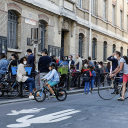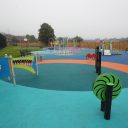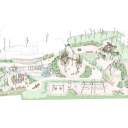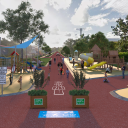


Forget the conspiracies, 15-minute cities will free us to improve our mental health and wellbeing
The idea of the 15-minute city, according to its originator Carlos Moreno, is that people are no more than a 15-minute walk or bike ride away from all the services they need to live, learn...Read more
Planting more trees could reduce premature heat-related deaths in European cities by a third – new research
Urban development leads to fewer shaded areas and more heat-absorbing paved surfaces. Cities tend to be warmer than their rural surroundings as a result, a phenomenon known as the urban heat island (UHI) effect.Read more
Paris commended for child-friendly sustainable transport policies
A commitment by Paris to prioritise sustainable transport options – including safe routes for children – has helped land it a major award.Read more
Cutting through red tape to enable more childcare facilities – could Austin become the standard bearer?
Could changing planning laws to allow for more childcare facilities in the U.S. city of Austin be a shining example for other cities to follow?Read more
Town planners’ expertise is ‘essential’ to children’s recovery from effects of pandemic
Town planning has a vital role to play in helping children bounce back from the pandemic, says the UK’s leading organisation for town planning.Read more
UK government urged to introduce more ‘walkable neighbourhoods’
Children’s safety in cities could be vastly improved if Sustrans, an influential charity that champions non-vehicle mobility, is successful in persuading the UK government to introduce more ‘walkable neighbourhoods’.Read more
Putting Melbourne’s on-street parking ‘undercover’ would mean a more child-friendly city
The streets of Melbourne could be made significantly more child-friendly if large swathes of on-street parking spaces were moved underground.Read more
Introducing the winners of the Real Play City Challenge 2022
A host of diverse child-friendly projects have been unveiled as this year’s winners of a global competition dedicated to ‘reclaiming places to play in cities’. The Real Play City Challenge was launched in 2020 by the...Read more
Outdoor play: benefits, influencing factors and actual behaviour of kids
More and more municipalities are, fortunately, working on play-friendly public spaces. However, many policy visions and investments are still based on assumptions made by municipal officials or suppliers of play equipment. This is partly because...Read more
How higher quality data can help improve urban planning and reduce inequities
Local-level, high-quality data can provide powerful insights for urban planning and lead to better policies on mobility, climate adaptation, gender equity and more. But only if the inputs are good and there’s enough capacity to analyse it effectively.Read more
Designing cities: Meet the Kids Leadership Accelerator ‘changemakers’
The Global Designing Cities Initiative (GDCI) has unveiled some 60 participants recently recruited to spearhead its Streets for Kids Leadership Accelerator programme, launched earlier this year. Read more
Cars have taken over our neighbourhoods. Kid-friendly superblocks are a way for residents to reclaim their streets.
You might remember your time as a child playing outdoors with friends and walking to school. These activities had tremendous benefits for our health and development.Read more
Report calls for children’s voices to be included in Australian government urban design policy
Children’s voices are missing from policies which shape the design of Australian cities.Read more
Child Friendly Cities Initiative – how to learn from local participation
UNICEF’s Child Friendly Cities Initiative has published a study highlighting the value to local governments of formally engaging with young people in helping plan cities’ and towns’ futures.Effective, representative, and inclusive child participation at the...Read more

